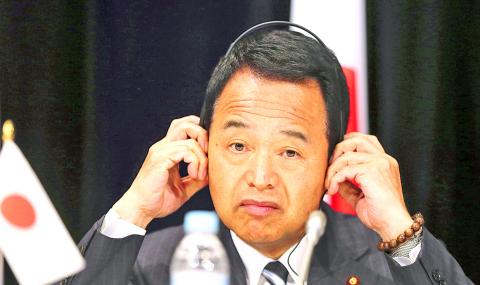As one of the most indebted countries in the developed world, the crisis unfolding in Greece is causing a moment of self-reflection for Japan.
However, policymakers and economic advisers in the world’s third-biggest economy are not drawing an uncomfortable lesson about the need for fiscal discipline.
Instead they see Greece’s present predicament as a warning against being too tight with the public purse strings and the follies of mindless austerity.

Photo: AP
“Greece raised taxes and cut spending, but as a result has seen tax revenues fall for three straight years,” Japanese Minister of Economy, Trade and Industry Akira Amari said last week. “Greece was doing what it thought was necessary. In fact, it pulled itself into further suffering with its economy shrinking.”
Still, the tiny European country has some resonance for Japan which, like Greece, has delayed tough fiscal reforms and pension cuts as lawmakers worried about losing popularity with voters.
Japan’s debt-to-GDP ratio, at roughly 230 percent, is much higher than Greece’s 175 percent and is set to rise due to the ballooning social welfare costs of its rapidly aging society.
Susumu Takahashi, a member of the Japanese government’s top economic advisory panel, said the country’s first priority should be to ensure it does not kill off a budding economic recovery, rather than implementing spending cuts like those seen in Greece.
“They didn’t get the balance right,” he said yesterday.
“What’s most important for Japan is to get the economy out of the doldrums,” he said.
However, some analysts say the Greek crisis underscores the importance of curbing Japan’s borrowing when the economy is still in good shape and investors are confident in its ability to repay its debt.
“You get more room for policy flexibility if you get fiscal reforms done in a short period of time,” Dai-ichi Life Research Institute chief economist Hideo Kumano said.
“By focusing too much on the current state of the economy, you risk underestimating the fiscal risks that may threaten future growth,” Kumano said.
Last week, Japan unveiled a blueprint on fiscal reform that, while advocating limited rises in spending over the coming three years, avoided setting mandatory caps on spending increases.
Takahashi was among those advocating Japanese Prime Minister Shinzo Abe’s approach of prioritizing steps to boost growth rather than spending cuts.
Still, Takahashi agrees that Japan must make some progress in enacting fiscal reforms while the Bank of Japan can buy it time by keeping borrowing costs low with its ultra-loose monetary policy.
“We enjoy a bonus from low interest rates now, but that will change when Japan emerges from deflation,” he said. “Once you lose market trust [over the handling of finances], it’s hard to gain it back and could suffer from a jump in interest rates.”

With an approval rating of just two percent, Peruvian President Dina Boluarte might be the world’s most unpopular leader, according to pollsters. Protests greeted her rise to power 29 months ago, and have marked her entire term — joined by assorted scandals, investigations, controversies and a surge in gang violence. The 63-year-old is the target of a dozen probes, including for her alleged failure to declare gifts of luxury jewels and watches, a scandal inevitably dubbed “Rolexgate.” She is also under the microscope for a two-week undeclared absence for nose surgery — which she insists was medical, not cosmetic — and is

CAUTIOUS RECOVERY: While the manufacturing sector returned to growth amid the US-China trade truce, firms remain wary as uncertainty clouds the outlook, the CIER said The local manufacturing sector returned to expansion last month, as the official purchasing managers’ index (PMI) rose 2.1 points to 51.0, driven by a temporary easing in US-China trade tensions, the Chung-Hua Institution for Economic Research (CIER, 中華經濟研究院) said yesterday. The PMI gauges the health of the manufacturing industry, with readings above 50 indicating expansion and those below 50 signaling contraction. “Firms are not as pessimistic as they were in April, but they remain far from optimistic,” CIER president Lien Hsien-ming (連賢明) said at a news conference. The full impact of US tariff decisions is unlikely to become clear until later this month

GROWING CONCERN: Some senior Trump administration officials opposed the UAE expansion over fears that another TSMC project could jeopardize its US investment Taiwan Semiconductor Manufacturing Co (TSMC, 台積電) is evaluating building an advanced production facility in the United Arab Emirates (UAE) and has discussed the possibility with officials in US President Donald Trump’s administration, people familiar with the matter said, in a potentially major bet on the Middle East that would only come to fruition with Washington’s approval. The company has had multiple meetings in the past few months with US Special Envoy to the Middle East Steve Witkoff and officials from MGX, an influential investment vehicle overseen by the UAE president’s brother, the people said. The conversations are a continuation of talks that

CHIP DUTIES: TSMC said it voiced its concerns to Washington about tariffs, telling the US commerce department that it wants ‘fair treatment’ to protect its competitiveness Taiwan Semiconductor Manufacturing Co (TSMC, 台積電) yesterday reiterated robust business prospects for this year as strong artificial intelligence (AI) chip demand from Nvidia Corp and other customers would absorb the impacts of US tariffs. “The impact of tariffs would be indirect, as the custom tax is the importers’ responsibility, not the exporters,” TSMC chairman and chief executive officer C.C. Wei (魏哲家) said at the chipmaker’s annual shareholders’ meeting in Hsinchu City. TSMC’s business could be affected if people become reluctant to buy electronics due to inflated prices, Wei said. In addition, the chipmaker has voiced its concern to the US Department of Commerce